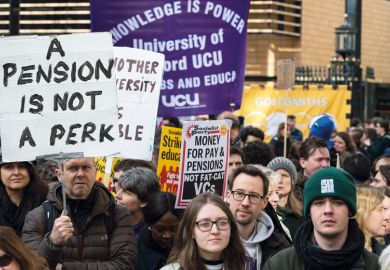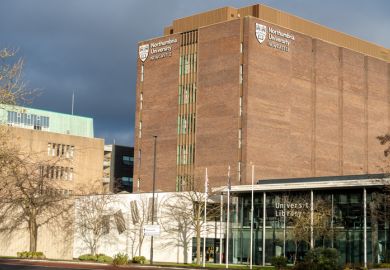Academics who claim that the Universities Superannuation Scheme’s deficit has been overestimated are misguided and ignoring economic reality, according to the fund’s trustee chairman.
Sir David Eastwood, the University of Birmingham vice-chancellor who has chaired the USS’ trustee board since 2015, said that the size of the scheme’s deficit, measured at £3.8 billion in March 2018, was now beyond dispute, despite claims by some union leaders that its deficit is illusory and further hikes to employee pension contributions are therefore unnecessary.
The University and College Union is currently balloting members on strike action over plans to increase employee contributions from 8.8 per cent to 9.6 per cent in October, and to 11 per cent from October 2021, to address the deficit and increased cost of pensions. Employer contributions will also rise to 21.1 per cent in October, and to 23.7 per cent from October 2021 under plans confirmed by the USS on 13 September.
In a briefing to journalists on 18 September alongside USS chief executive officer Bill Galvin, Sir David said that he believed the scheme’s calculations would soon be endorsed by the Pensions Regulator, meaning that there was “no meaningful debate about the [required] funding levels and deficit”.
Worsening economic conditions since the April 2018 valuation also meant that the scheme’s financial position was likely to be “more adverse” if the regulator disputed its figures, Sir David added. In July, the USS reported the scheme’s deficit had widened to £5.7 billion by April 2019.
Sir David credited some of the uncertainty about the USS’ deficit to a report by an expert panel jointly nominated by Universities UK and the UCU, published in September 2018. The panel was set up five months earlier following 14 days of strikes at 65 universities over UUK’s proposal – now dropped – to end guaranteed payments to retirees and instead link their income to the performance of investments.
The Joint Expert Panel claimed that the scheme’s deficit could be reduced by revising certain assumptions about mortality and investment and covered by increasing overall contribution levels to 29.2 per cent overall – suggesting that employees contribute 9.1 per cent of salary and employers 20.1 per cent. But some campaigners claim that the JEP’s recommendations would, in fact, completely wipe out the USS’s deficit if they were applied in full, allowing employee contributions to return to 8 per cent.
But Sir David said that the USS trustee board could not take the same view as the JEP because it was required by law to take a more cautious view of the scheme’s long-term health, including considering potential economic shocks or downturns in the yields from its £72 billion in assets.
“The JEP report does not look at downside events – we are required to do that and have an appropriate level of prudence,” said Sir David, who claimed that the JEP’s view was “all upside and no downside".
“Since April 2018, the economic situation has become more challenging – none of that is included in the JEP, so it is not surprising that the [contribution level] figure on which we could settle is north of what the JEP included,” he added.
Mr Galvin said that the USS had done “much more detailed work” investigating the JEP’s “high-level analysis” and had come “as close as we could get” to their position considering their legal duties.
Sir David admitted that last year’s strikes over pensions had been “acrimonious”, but said that the current dispute centred on different issues.
“That dispute was about an employer proposal to move the scheme from defined benefits to defined contributions – the current dispute is about contributions, not about benefits,” he said, adding that “we will see how it will play out”.
Register to continue
Why register?
- Registration is free and only takes a moment
- Once registered, you can read 3 articles a month
- Sign up for our newsletter
Subscribe
Or subscribe for unlimited access to:
- Unlimited access to news, views, insights & reviews
- Digital editions
- Digital access to THE’s university and college rankings analysis
Already registered or a current subscriber?








